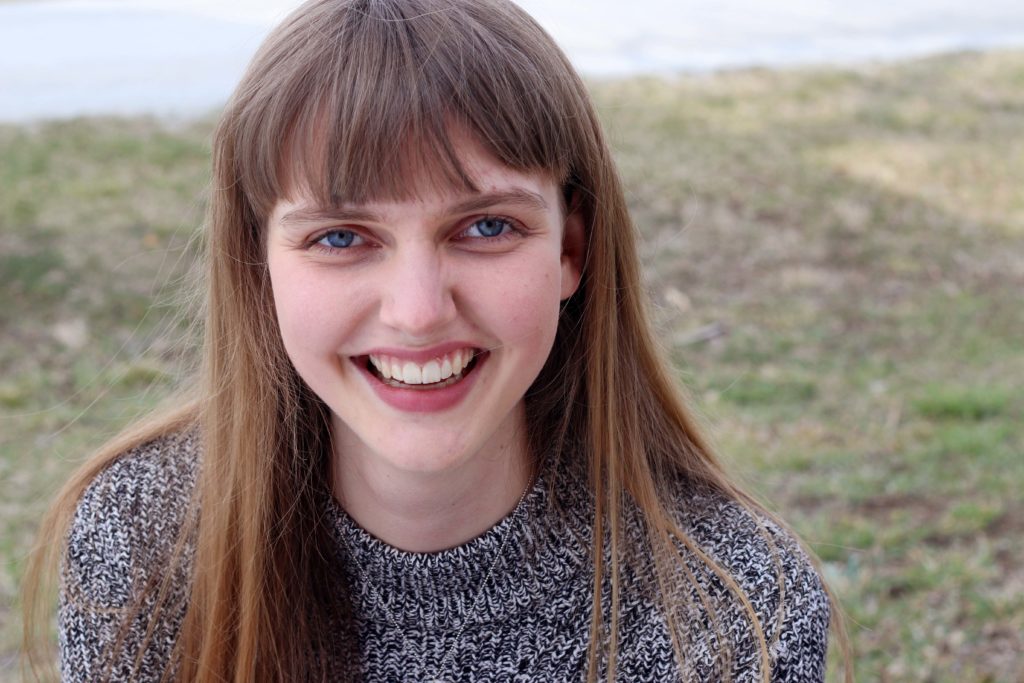This post is part of a blog series on racial justice where writers reflect on what it means to do anti-racism work in their context.
 Greta Lapp Klassen is a sophomore at Goshen College, studying English and Education. Growing up, she attended Assembly Mennonite Church in Goshen, where she learned about the importance of serving others and fighting for justice. After graduating high school, she spent a year in Santa Cruz, Bolivia with Mennonite Central Committee’s SALT program, working at a children’s home and daycare. She enjoys reading and writing, baking and cooking, creating art and learning new languages.
Greta Lapp Klassen is a sophomore at Goshen College, studying English and Education. Growing up, she attended Assembly Mennonite Church in Goshen, where she learned about the importance of serving others and fighting for justice. After graduating high school, she spent a year in Santa Cruz, Bolivia with Mennonite Central Committee’s SALT program, working at a children’s home and daycare. She enjoys reading and writing, baking and cooking, creating art and learning new languages.
_______________
A few months ago, I spent an evening helping my best friend move her parents into a new house just across town. We loaded up her old green minivan with cabinets and boxes and shelving units, driving back and forth across town to load and unload, working until it was dark and buggy outside. We packed the van precariously until every crevice was filled. You couldn’t see out the back window, and three of us had to cram into the two front seats. We joked lightheartedly about getting pulled over, fully realizing that we were not driving safely.
We must have jinxed ourselves, because sure enough, a few blocks from our destination the flashing red and blue lights of a police car lit up behind us. We pulled aside, panicking about the various traffic laws we were breaking. Two people sharing one seat, no seatbelt, and a blocked back window. We were bound to get a ticket. We braced ourselves for the worst.
The officer got out of his car, walked over to us, glanced at my white friend in the driver’s seat and smiled, giving us an abashed wave.
“Just wanted to let you know that your headlights should be on, now that it’s getting darker. Y’all have a nice evening.”
He didn’t ask for license, registration, or even what we were doing with a minivan full of random stuff. He didn’t seem to mind that two women were sharing the passenger seat, without a seat belt. In fact, he seemed almost embarrassed to have pulled us over; he was sheepish, apologetic and friendly. Frankly, the whole interaction was confusing. The rest of the evening passed without a hitch, and we almost forgot about our brief run-in with the law. Yet lingering in our minds was one simple and unsettling question — What would have happened if we had been Black?
I am very aware I exist in a bubble. I belong to an extremely supportive church community, one that has formed me, looked out for me, and supported me throughout my childhood. I am grateful for this community and that I have a place to belong, yet when I take stock of the important people in my life, I see almost exclusively white, Mennonite faces. I love and appreciate these faces, but I know that if I am to understand racial injustice and become a true anti-racist, I need to diversify the narratives I participate in and consume. And I need to do it now.
Leaving a comfort bubble takes work. It can be uncomfortable. Mistakes will be made. We will feel ignorant. We must let ourselves feel incompetent, because only then will we make progress. As I do this work myself, I invite everyone in my community to do the same.
We all must stare down our inner-oppressors, and tell them, loudly and clearly, that we won’t be silent or complicit any more.
Here are some of the concrete ways we can work on dismantling racism personally and in our communities, with some examples from my own experience.
We can diversify the media we consume. I am reading novels and watching television shows written by and featuring people of color. I am listening to new types of music. I am following BIPOC (Black, Indigenous, people of color) artists and activists on social media. I am not consuming news or political commentary written exclusively by white people. I am unlearning and relearning all the history, and examining it from the perspective of those who have been oppressed. I am listening to podcasts and watching documentaries. We must listen and learn.
We can participate in movements led by BIPOC activists. I am attending local protests, (masked, of course), and I am following their lead. I am donating what I can to BIPOC organizations who are doing good work, and I am sharing their informational content. I am signing petitions and writing emails to my representatives. I am thinking critically about the ways I and others behave, and I am making corrections. I am lifting up the voices of others, rather than making statements about how outraged I am. Sharing my outrage, and the outrage of other white people is not important. All of our energy should be focused on making productive change. Declaring that I am upset might make me feel good, but it won’t change anything. We will not make this fight about us. Instead we will show up for others.
We can work in our own communities to help those who have been ignored by our country’s broken systems. Healthcare in the United States is extremely broken, and this has become even more obvious recently due to the Coronavirus. COVID-19 is disproportionately affecting Black people and other minority communities, demonstrating the intersectionality of different types of injustice. I am working at a local clinic that serves the uninsured, helping register people for free COVID tests so that they can get the medical attention they deserve. We should put ourselves into worlds that were previously unknown to us, and we should do what we can to help without co-opting the spaces.
We can share what we are learning and experiencing with our families, friends and communities. I am using the power I have as a white, privileged member of society to have conversations with other white people.
While it can be more comfortable to err on the side of silence, silence is violence, and as pacifists, it is our duty to promote peace.
As Mennonites, many of us can easily choose to remain in our bubbles. We are fully equipped to pretend like nothing is happening, or even worse, that we are inherently just and good people because of our religious convictions or church membership. However, our faith alone does not make us good people. Faith should not allow us to sit comfortably; rather it must compel us to work tirelessly for change. Let’s join together and change our behavior for the better. Now is the time to start showing up, and to keep showing up. The fight is far from over.


